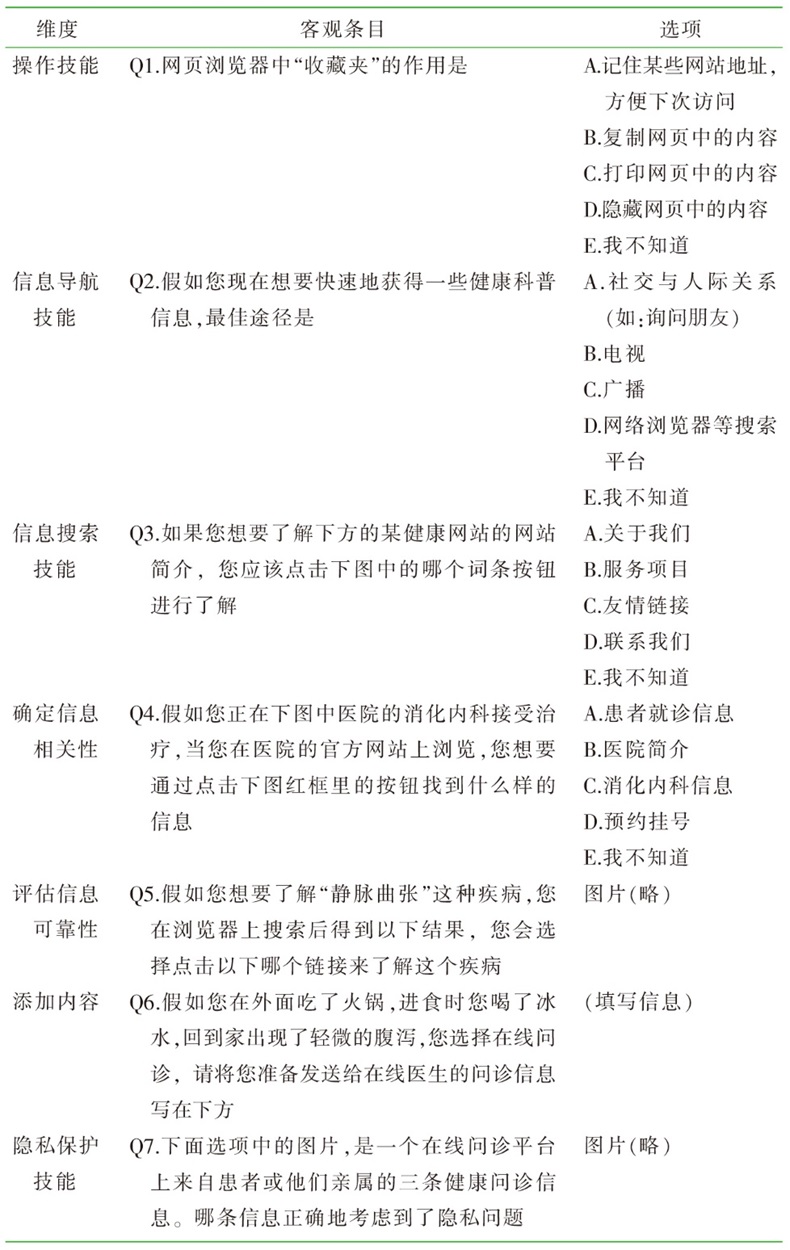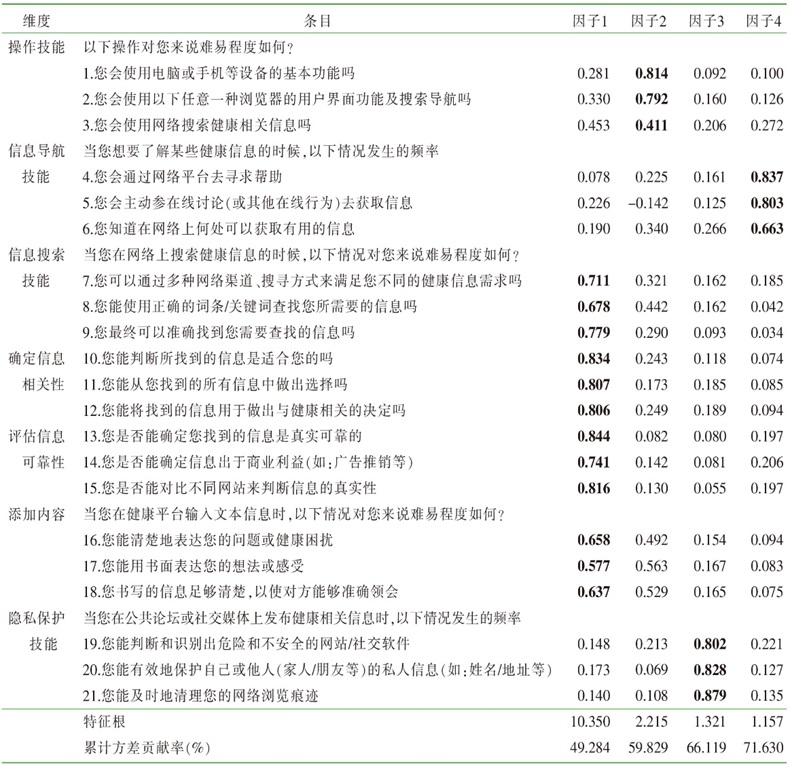| [1] |
Norman CD, Skinner HA. eHealth literacy:essential skills for consumer health in a networked world[J]. J Med Internet Res, 2006, 8(2):e9.
doi: 10.2196/jmir.8.2.e9
|
| [2] |
Yang K, Hu YK, Qi HY. Digital health literacy:bibliometric analysis[J]. J Med Internet Res, 2022, 24(7):e35816.
doi: 10.2196/35816
|
| [3] |
Xiong ZH, Zhang L, Li Z, et al. Frequency of online health information seeking and types of information sought among the general Chinese population:cross-sectional study[J]. J Med Internet Res, 2021, 23(12):e30855.
doi: 10.2196/30855
|
| [4] |
中国科普研究所. 中国科协科普部中国网民科普需求搜索行为报告(2019年第三季度)[EB/OL].[2022-08-29]. https://www.163.com/dy/article/F24ASOQG0511D9E4.html.
|
| [5] |
李红敏, 孟庆跃, 王书平, 等. 农村居民电子健康素养对健康水平影响研究[J]. 医学信息学杂志, 2019, 40(7):68-72.
|
|
Li HM, Meng QY, Wang SP, et al. Study on influences on health level by eHealth literacy of rural residents[J]. J Med Intell, 2019, 40(7):68-72.
|
| [6] |
郭帅军, 余小鸣, 孙玉颖, 等. eHEALS健康素养量表的汉化及适用性探索[J]. 中国健康教育, 2013, 29(2):106-108,123.
|
|
Guo SJ, Yu XM, Sun YY, et al. Adaptation and evaluation of Chinese version of eHEALS and its usage among senior high school students[J]. Chin J Health Educ, 2013, 29(2):106-108,123.
|
| [7] |
李美茜, 李春玉, 周丽, 等. 国内外数字健康素养评估工具的研究进展[J]. 全科护理, 2022, 20(7):906-910.
|
|
Li MQ, Li CY, Zhou L, et al. Research progress on digital health literacy assessment tools at home and abroad[J]. Chin Gen Pract Nurs, 2022, 20(7):906-910.
|
| [8] |
Norman C. eHealth literacy 2.0:problems and opportunities with an evolving concept[J]. J Med Internet Res, 2011, 13(4):e125.
doi: 10.2196/jmir.2035
|
| [9] |
Liu P, Yeh LL, Wang JY, et al. Relationship between levels of digital health literacy based on the Taiwan digital health literacy assessment and accurate assessment of online health information:cross-sectional questionnaire study[J]. J Med Internet Res, 2020, 22(12):e19767.
doi: 10.2196/19767
|
| [10] |
Chen YC, Cheng C, Osborne RH, et al. Validity testing and cultural adaptation of the eHealth literacy questionnaire (eHLQ) among people with chronic diseases in Taiwan:mixed methods study[J]. J Med Internet Res, 2022, 24(1):e32855.
doi: 10.2196/32855
|
| [11] |
van der Vaart R, Drossaert C. Development of the digital health literacy instrument:measuring a broad spectrum of health 1.0 and health 2.0 skills[J]. J Med Internet Res, 2017, 19(1):e27.
doi: 10.2196/jmir.6709
|
| [12] |
Rivadeneira MF, Miranda-Velasco MJ, Arroyo HV, et al. Digital health literacy related to COVID-19:validation and imple-mentation of a questionnaire in hispanic university students[J]. Int J Environ Res Public Health, 2022, 19(7):4092.
doi: 10.3390/ijerph19074092
|
| [13] |
Chun H, Park EJ, Choi SK, et al. Validating the Digital Health Literacy Instrument in relation to COVID-19 information (COVID-DHL-K) among South Korean undergraduates[J/OL]. International Journal of Environmental Research and Public Health, 2022, 19(6). https://www.ncbi.nlm.nih.gov/pmc/articles/PMC8950100/.
|
| [14] |
Brislin RW. Back-translation for cross-cultural research[J]. J Cross Cult Psychol, 1970, 1(3):185-216.
doi: 10.1177/135910457000100301
|
| [15] |
李峥, 刘宇. 护理学研究方法[M]. 北京: 人民卫生出版社, 2012.
|
| [16] |
史静琤, 莫显昆, 孙振球. 量表编制中内容效度指数的应用[J]. 中南大学学报(医学版), 2012, 37(2):152-155.
|
| [17] |
金勇进, 刘晓宇. 大数据背景下的抽样调查[J]. 系统科学与数学, 2022, 42(1):2-16.
|
|
Jin YJ, Liu XY. Sampling survey in the context of big data[J]. J Syst Sci Math Sci, 2022, 42(1):2-16.
|
| [18] |
约翰·罗斯特, 苏珊·格伦博. 现代心理测量学[M]. 李晓,缪晶晶,译. 北京: 中国人民大学出版社, 2011.
|
| [19] |
Chan CV, Kaufman DR. A framework for characterizing eHealth literacy demands and barriers[J]. J Med Internet Res, 2011, 13(4):e94.
doi: 10.2196/jmir.1750
|
| [20] |
van Dijk JAGM. Internet skills performa-nce tests:are people ready for eHealth?[J]. J Med Internet Res, 2011, 13(2):e35.
doi: 10.2196/jmir.1581
|
| [21] |
DeVon HA, Block ME, Moyle-Wright P, et al. A psychometric toolbox for testing validity and reliability[J]. J Nurs Scholarsh, 2007, 39(2):155-164.
doi: 10.1111/jnu.2007.39.issue-2
|
| [22] |
国务院办公厅. 国务院办公厅关于促进“互联网+医疗健康”发展的意见(国办发〔2018〕26号)_政府信息公开专栏[EB/OL]. (2018-04-28)[2022-08-28]. http://www.gov.cn/zhengce/content/2018-04/28/content_5286645.htm.
|
| [23] |
王刚, 高皓宇, 李英华. 国内外电子健康素养研究进展[J]. 中国健康教育, 2017, 33(6):556-558,565.
|
|
Wang G, Gao HY, Li YH. Review of e-health literacy in China and abroad[J]. Chin J Health Educ, 2017, 33(6):556-558,565.
|
| [24] |
Shiferaw KB, Mehari EA, Eshete T. eHealth literacy and In-ternet use among undergraduate nursing students in a re-source limited country:a cross-sectional study[J]. Inform Med Unlocked, 2020, 18:100273.
doi: 10.1016/j.imu.2019.100273
|
| [25] |
Rathnayake S, Senevirathna A. Self-reported eHealth literacy skills among nursing students in Sri Lanka:a cross-sectional study[J]. Nurse Educ Today, 2019, 78:50-56.
doi: 10.1016/j.nedt.2019.04.006
|
| [26] |
Kritsotakis G, Andreadaki E, Linardakis M, et al. Nurses’ ehealth literacy and associations with the nursing practice environ-ment[J]. Int Nurs Rev, 2021, 68(3):365-371.
doi: 10.1111/inr.12650
pmid: 34004022
|
| [27] |
Shiu LS, Liu CY, Lin CJ, et al. What are the roles of eHealth literacy and empowerment in self-management in an eHealth care context? A cross-sectional study[J]. J Clin Nurs, 2023, 32(23/24):8043-8053.
doi: 10.1111/jocn.v32.23-24
|
| [28] |
Navarro Martínez O, Igual García J, Salcedo VT. Nurses’ view of benefits,enablers and constraints to the use of digital health tools with patients:a cross-sectional study[J]. Digital Health, 2023, 9:20552076231197339.
|
| [29] |
Mitsutake S, Shibata A, Ishii K, et al. Association of eHealth literacy with colorectal cancer knowledge and screening practice among Internet users in Japan[J]. J Med Internet Res, 2012, 14(6):e153.
doi: 10.2196/jmir.1927
|
| [30] |
Kim H, Yang E, Ryu H, et al. Psychometric comparisons of measures of eHealth literacy using a sample of Korean older adults[J]. Int J Older People Nurs, 2021, 16(3):e12369.
doi: 10.1111/opn.v16.3
|
| [31] |
Dadaczynski K, Okan O, Messer M, et al. Digital health literacy and web-based information-seeking behaviors of university students in Germany during the COVID-19 pandemic:cross-sectional survey study[J]. J Med Internet Res, 2021, 23(1):e24097.
doi: 10.2196/24097
|



